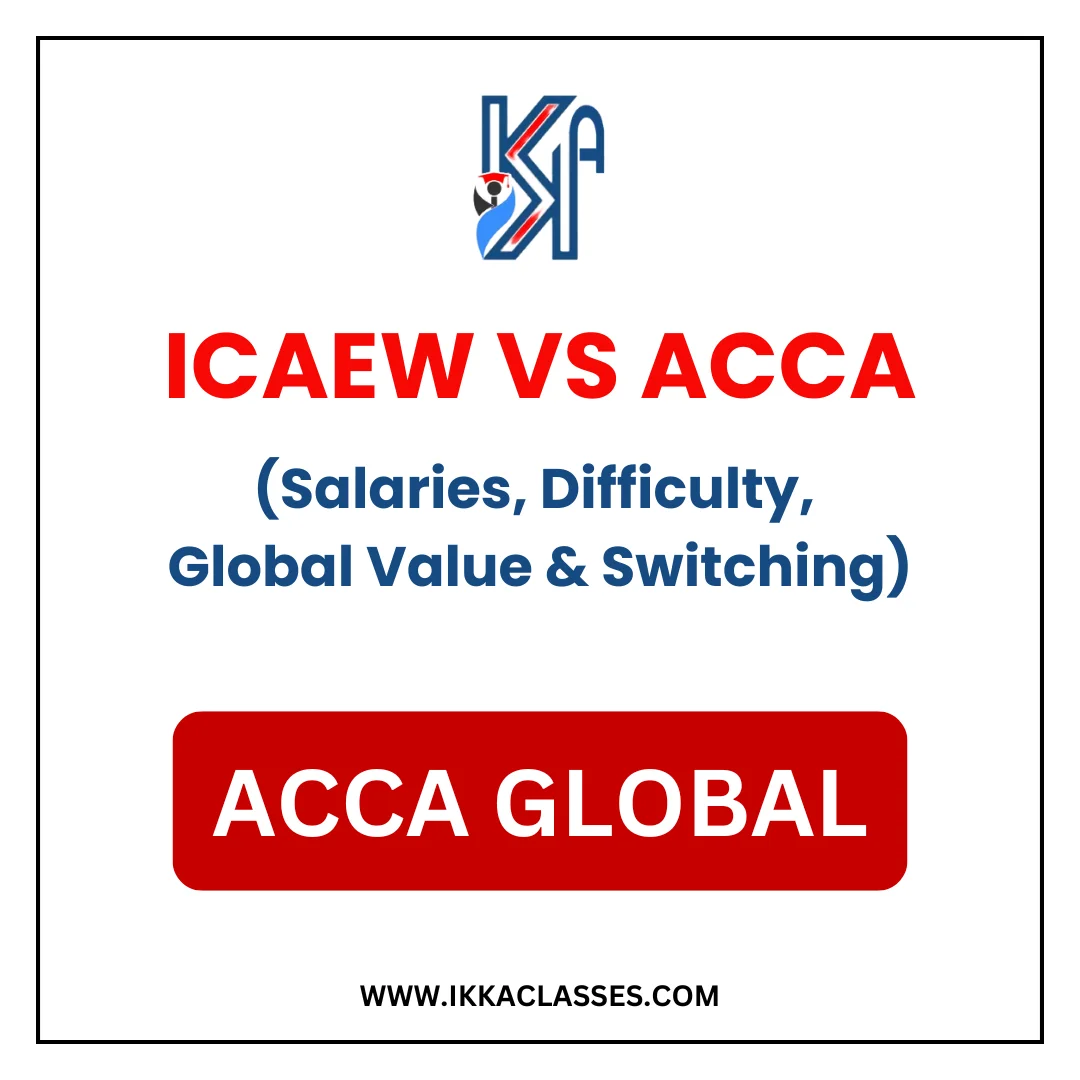Thinking about a career in accounting or finance? You’ve likely come across ICAEW and ACCA. Both offer globally recognised qualifications. Both lead to high-paying, professional roles. But if you look closely, their core structural differences can impact how your career unfolds.
This blog post covers the difference between ICAEW vs ACCA as per salary, career fit, exam structure, and budget. By the end of the blog, you will be able to decide which one works better for you.
Table of Contents
ToggleICAEW Vs ACCA
Let’s start with the basics.
- ACCA stands for the Association of Chartered Certified Accountants. Its qualification is more flexible and globally recognised, especially across Asia, the Middle East, and Africa.
- ICAEW stands for the Institute of Chartered Accountants in England and Wales. ACA is the full professional qualification awarded by ICAEW, just as ACCA is the full qualification from the Association of Chartered Certified Accountants.
Both are professional accounting bodies. Both give you the right to sign off accounts, work in finance leadership roles, or build careers in public practice. But their structure, training model, and exam path are not the same.
Let’s also check the history and legacy of these professions
ICAEW was established in 1880 by Royal Charter. It’s one of the oldest and most prestigious chartered accounting bodies in the world. Over the years, it’s become known for its strong links with UK audit, public practice, and advisory firms. Today, ICAEW supports over 195,000 members and students across 155+ countries.
On the other side, ACCA started in 1904, with a focus on inclusivity. It’s now one of the largest global accountancy bodies, with more than 247,000 members and 526,000 students across 180+ countries.
Differences In Syllabus, Duration, And Exam Structure Between ACCA And ICAEW?
When choosing between ACCA and ICAEW ACA, these are the key differences in what you study, how long it takes, and how the exams work.
Aspect | ICAEW ACA | ACCA |
Levels | Certificate → Professional → Advanced | Applied Knowledge → Applied Skills → Strategic Professional |
Core subjects | Accounting, assurance, law, tax, financial management, corporate reporting | Accounting, law, tax, audit, financial management, strategy |
Number of exams | 15 (5 + 6 + 4) | 13 papers (3 + 6 + 4) |
Practical experience | 450 days under authorised training employer | 3 years flexible (varied work accepted) |
Exam structure | More written-based assessments | A mix of multiple-choice + case studies + scenario-based questions |
Study format | Highly structured, often through employers | Self-paced or tuition provider-based |
Ethics requirement | Ethics is embedded in all stages | Online Ethics and Professional Skills Module |
Which Is More Challenging Between ICAEW Vs ACCA?
Every student wonders: Is one qualification harder than the other? Let’s find out!
In terms of Academic Depth & Practical Training:
ICAEW ACA
- Includes 15 papers spanning certificate to advanced levels
- Requires 450 days of work experience under an authorised employer
- Case-study exams simulate real scenarios
- Students often say early certificate papers, like accounting are a steep climb
In terms of exam difficulty
ACCA exams are tough to clear, especially at the professional level. Papers like Advanced Audit and Financial Management have pass rates below 45%.
ICAEW ACA exams, on the other hand, test real-life scenarios. The case study paper in the final stage is known for being lengthy, detailed, and built around business simulation. But, the average pass rate is around 70-80% for most papers in the certificate and professional levels.
Bottom line: Both are demanding.
- ACCA demands consistent effort over time.
- ICAEW ACA pushes early with structure, practical training, and tougher assessments.
Your experience will depend on how you manage workload, exam format, and support.
If you like flexibility and want to spread exams out over time, ACCA may feel more manageable. But clearing all 13 still requires discipline. But, if you prefer structure and thrive under a fixed study-employer track, ACA might suit you.
How Do ICAEW And ACCA Compare In The UK And Malaysia?

ICAEW vs ACCA Malaysia:
In Malaysia, students often compare ACCA vs ICAEW Malaysia for their recognition and relevance.
ACCA Malaysia has a longstanding mutual recognition agreement (MRA) with MICPA and recognition via MI. Meanwhile, ICAEW is supported by the ICAEW SEA network.
ACCA tends to be preferred for roles in MNCs and industry, while ICAEW suits those entering audit or regulatory fields.
Experience Level | ACCA Salary (Avg Monthly) | ICAEW Salary (Avg Monthly) |
Entry Level (0–2 years) | RM 3,500 – RM 5,500 | RM 4,000 – RM 6,000 |
Mid-Level (3–5 years) | RM 6,000 – RM 9,000 | RM 7,000 – RM 10,500 |
Senior Roles (6–10 years) | RM 10,000 – RM 14,000 | RM 12,000 – RM 16,000 |
ICAEW vs ACCA UK
In the UK, ICAEW is often a default choice for students placed through authorised training employers. It is highly valued by UK audit firms, especially the Big 4.
Both bodies are recognised by UK regulators like the FRC. ACCA is a Recognised Supervisory Body, and ACA is the default for UK‑qualified auditors.
Here is a breakdown of the payscale for ACCA vs ICAEW in the UK:
Experience Level | ACCA (avg) | ICAEW ACA (avg) |
Entry Level | £28,000 – £35,000 | £30,000 – £38,000 |
Mid-Level | £40,000 – £60,000 | £45,000 – £65,000 |
Senior Roles | £90,000 – £120,000+ | £100,000 – £130,000+ |
How Do Salaries Compare Between ICAEW And ACCA Professionals In The UK?
ICAEW vs ACCA Salary – Who Earns More? Below is the ACCA vs ICAEW UK salary comparison to understand better:
Role / Region | ACCA Salary | ICAEW ACA Salary |
India – Entry-Level | ₹4–6 LPA | ₹5–7 LPA (via UK-affiliated firms) |
India – 3 to 5 Years Exp | ₹8–14 LPA | ₹10–16 LPA |
India – Senior Roles (CFO/FM) | ₹20–40 LPA | ₹25–50 LPA |
UK – Entry-Level | £28,000–£35,000 | £30,000–£38,000 |
UK – 3 to 5 Years Exp | £40,000–£60,000 | £45,000–£65,000 |
UK – Senior Roles (10+ Yrs) | £70,000–£100,000 | £80,000–£120,000+ |
Note: ICAEW professionals often earn slightly more in audit and practice roles, especially in the UK. However, ACCA gives a broader scope for international roles and flexible pathways.
Both paths can lead to senior leadership. The right choice depends on whether you see yourself in practice or industry, and where you plan to build your career.
Choose ICAEW ACA if you’re targeting senior audit roles in the UK or regulated markets. Go for ACCA if you are looking for global career flexibility or industry roles.
How Does The ICAEW ACA Compare With The ACCA Qualification?
ICAEW vs ACCA which is better qualification? Well, it depends on what you’re aiming for.
Both are respected globally, but their structure, study approach, and industry fit differ.
ACA is highly regarded in:
- UK-based audit and practice firms
- Advisory, consulting, and Big 4 roles
- Senior leadership roles in finance across Europe
ACCA fits best for:
- Multinational companies, especially in Asia, the Middle East, and Africa
- Roles in financial planning, management accounting, and internal audit.
Can You Switch From ACCA To ICAEW Or Combine Both?

Many students with ACCA wonder if they can switch to ICAEW. Well, the short answer is: yes. You can apply to register as an ACA student with ICAEW. But there’s no automatic crossover.
You will need to:
- Register for formal ACA training through an Authorised Training Employer
- Check if you’re eligible for credits for prior learning (some exemptions may apply based on ACCA exams passed)
- Complete any remaining ACA exams, practical work experience, and ethics modules required by ICAEW
So, while there’s no direct switch, your ACCA learning might lighten the load.
Note: If you plan to practise in the UK as an ICAEW member, you must also apply for a practising certificate. ICAEW only grants this if you’ve held ACCA membership for at least two years.
Which Qualification Is Better Based On Global Recognition, Cost, And Career Paths?
Confused about ICAEW vs ACCA which is better? If you are trying to decide between ICAEW and ACCA,
start by thinking about where you want to work and what kind of career you are aiming for.
Consider examining the following factors to find the right fit:
1. Global Recognition
The ACCA qualification is accepted in over 180+ countries. On the other hand, an ICAEW degree carries more weight in countries like the UK and Europe.
2. Cost of Program: ICAEW vs ACCA
ACCA tends to be more budget-friendly, especially if you opt for self-study. ICAEW has a more structured (and costlier) model, often through accredited employers or training firms.
Below is a comparison of course fees for ICAEW vs ACCA
Cost Area | ACCA (approx) | ICAEW (approx) |
Registration | ₹8,000–₹10,000 | ₹20,000+ (via training partner) |
Exam Fees | ₹10,000 to ₹20,000 as you progress to a new level. | ₹10,000 to ₹35,000 depending on levels |
Annual Subscription | Starting at 15,600 | ₹20,000 -25,000 |
Study Material | Moderate (self-paced or tuition) | Often bundled with structured training |
Duration | 2–3 years | 3–5 years (with work placement) |
3. Career Paths and Job Roles
ACCA opens doors to career opportunities in –
- Financial analyst roles
- Management accounting
- Global finance teams and MNCs
- Internal audit and tax consulting
- Entry to mid-level leadership roles
ICAEW leads to –
- Statutory audit positions in the UK
- Financial controller and CFO roles
- Practice firms and advisory
- Senior roles in corporate governance and risk
TL; DR – ICAEW vs ACCA
Pick ICAEW if:
- You want to work in the UK or for a British firm
- You prefer a formal, structured training environment
- You’re aiming for high-level roles in practice
Choose ACCA if:
- You want international mobility
- You want more control over study pace and costs
- You are interested in corporate finance or industry roles
Frequently Asked Questions About ICAEW Vs ACCA
Is ICAEW More Difficult Than ACCA?
When we compare ICAEW vs ACCA difficulty, ICAEW is considered more difficult than the latter.
Is ACCA Equivalent To ICAEW Or ACA In Career Value?
Both ACCA and ICAEW are well-regarded professions, but ACCA has a more strong value and global recognition compared to ICAEW.

